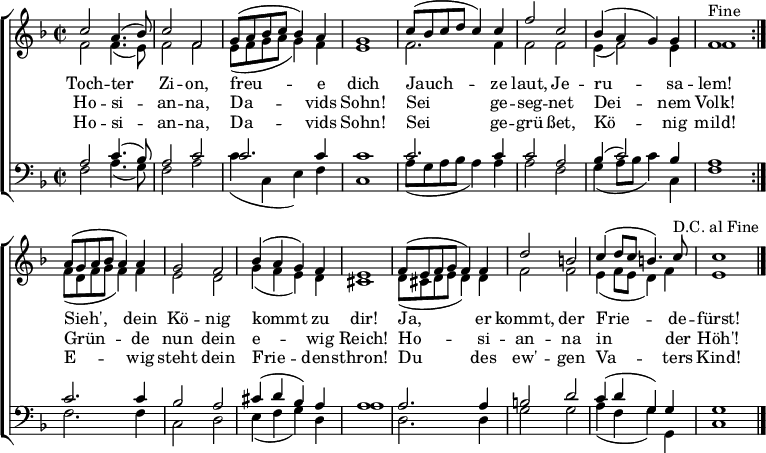Tochter Zion, freue dich
| "Tochter Zion, freue dich" | |
|---|---|
| Christian hymn | |
 In Liederkranz für Sonntags-Schulen und Jugend-Vereine, St. Louis, 1898 | |
| Text | Friedrich Heinrich Ranke |
| Language | German |
| Based on | Movement from Joshua |
| Melody | George Frideric Handel |
| Composed | 1747 (1747) |
| Published | 1826 (1826) |
"Tochter Zion, freue dich" (Daughter Zion, rejoice) is an Advent song in German. The text was written by Friedrich Heinrich Ranke, based on music derived from two of Handel's oratorios. The song was published in 1826, assigned to the Entry into Jerusalem. The hymn is part of the German Protestant hymnal Evangelisches Gesangbuch as EG 13 and the 2013 Catholic hymnal Gotteslob as GL 228, both four-part settings in the Advent section.
The French hymn À toi la gloire O Ressuscité and its English translation Thine Be the Glory use the same tune.
History
Friedrich Heinrich Ranke wrote the text, based on music by George Frideric Handel, for a musical salon of Karl Georg von Raumer around 1820.[1] He knew the music as "Seht, er kommt, mit Preis gekrönt", a chorus from Handel's oratorio Judas Maccabaeus.[1] Handel had first composed it in 1747 for the oratorio Joshua, and added it to Judas Maccabaeus in a revised version in 1751, as See, the Conquering Hero Comes.[1] In both works, the music reflects the triumphant entry of a victorious hero.[2]
The hymn was first published in Hamburg in 1826 in the collection Christliche, liebliche Lieder by Louise Reichardt, Raumer's sister-in-law, and assigned to the Entry into Jerusalem, which at the time had the same prescribed readings as the first Sunday of Advent.[3] It entered collections for schools and became popular.[1]
The hymn is part of the German Protestant hymnal Evangelisches Gesangbuch as EG 13 and the 2013 Catholic hymnal Gotteslob as GL 228, both four-part settings in the Advent section.[3]
Music
Handel's music is a chorus with short lines, sung in homophony.[2] It is written in march rhythm and harmonic simplicity. In Handel's works, the first of three stanzas is scored for three voices, two sopranos and an alto, accompanied by two horns and organ. A second stanza with different text is written for two sopranos, two flutes and organ. Finally, the third stanza, with the text of the first, is sung by four choral parts and a rich basso continuo in dramatic development. Ranke used only the four-part setting, which he modified slightly.[2]


References
Citations
- ^ a b c d Parent & Stalmann 2000, p. 17.
- ^ a b c Parent & Stalmann 2000, p. 20.
- ^ a b Parent & Stalmann 2000, p. 18.
Cited sources
- Parent, Ulrich; Stalmann, Joachim (2000). "13 – Tochter Zion, freue dich". In Hahn, Gerhard; Henkys, Jürgen (eds.). Liederkunde zum Evangelischen Gesangbuch (in German). Vandenhoeck & Ruprecht. pp. 18–22. ISBN 978-3-52-550326-3.
External links
 Media related to See, the conqu'ring hero comes at Wikimedia Commons
Media related to See, the conqu'ring hero comes at Wikimedia Commons
- v
- t
- e

- "Adam lay ybounden"
- "Advent är mörker och kyla"
- Advent song
- Adventstid
- Angelus ad virginem
- "Bereden väg för Herran"
- "Come, thou Redeemer of the earth"
- "Conditor alme siderum"
- "The Cherry-Tree Carol"
- "Come, Thou Long Expected Jesus"
- "Det är advent"
- "Es ist ein Ros entsprungen"
- Gabriel's Message
- "The Holly and the Ivy"
- "Hosianna, Davids son"
- "In das Warten dieser Welt"
- "Jesus Christ the Apple Tree"
- "Kündet allen in der Not"
- "Lo! He comes with clouds descending"
- "Long Ago, Prophets Knew"
- "Macht hoch die Tür"
- "Macht weit die Pforten in der Welt"
- "Maria durch ein Dornwald ging"
- "Meine Seele, dank und singe"
- "Mit Ernst, o Menschenkinder"
- "Der Morgenstern ist aufgedrungen"
- "Nun komm, der Heiden Heiland"
- O Antiphons
- "O Come, O Come, Emmanuel"
- "O Heiland, reiß die Himmel auf"
- "O How Shall I Receive Thee"
- "Of the Father's Heart Begotten"
- Rorate Caeli
- "Sei uns willkommen, Herre Christ"
- "Singet fröhlich im Advent"
- "There is no rose of such virtue"
- "Tochter Zion, freue dich"
- "Savior of the Nations, Come"
- "Vi tänder ett ljus i advent"
- "Hark, a Thrilling Voice Is Sounding"
- "Wachet auf, ruft uns die Stimme"
- Ärgre dich, o Seele, nicht, BWV 186a
- Bereitet die Wege, bereitet die Bahn, BWV 132
- Herz und Mund und Tat und Leben, BWV 147a
- Handel's Messiah (Part I)
- Nun komm, der Heiden Heiland (Böhm)
- Nun komm, der Heiden Heiland, BWV 61
- Nun komm, der Heiden Heiland, BWV 62
- This Is the Record of John
- Unser lieben Frauen Traum
- Virga Jesse (Bruckner)
- Wachet auf, ruft uns die Stimme, BWV 140
- Wachet! betet! betet! wachet! BWV 70a
- Wir sagen euch an den lieben Advent
- List of Advent cantatas
- Anglican church music
- Catholic music
- Lutheran hymns
- Carol service
- Christmastide
- Liturgical year
 Category
Category Commons
Commons Christianity portal
Christianity portal













